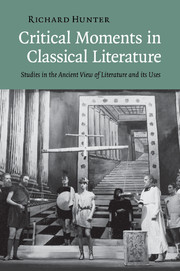Book contents
- Frontmatter
- Contents
- Acknowledgements
- List of abbreviations
- Introduction
- 1 Aristophanes' Frogs and the critical tradition
- 2 Readings of Homer: Euripides' Cyclops
- 3 Comic moments
- 4 The ugly peasant and the naked virgins: Dionysius of Halicarnassus, On Imitation
- 5 The grand and the less grand: ‘Longinus’, On the Sublime
- 6 Reading for life: Plutarch, ‘How the young man should study poetry’
- Bibliography
- Index of passages discussed
- General index
Introduction
Published online by Cambridge University Press: 03 May 2010
- Frontmatter
- Contents
- Acknowledgements
- List of abbreviations
- Introduction
- 1 Aristophanes' Frogs and the critical tradition
- 2 Readings of Homer: Euripides' Cyclops
- 3 Comic moments
- 4 The ugly peasant and the naked virgins: Dionysius of Halicarnassus, On Imitation
- 5 The grand and the less grand: ‘Longinus’, On the Sublime
- 6 Reading for life: Plutarch, ‘How the young man should study poetry’
- Bibliography
- Index of passages discussed
- General index
Summary
At an important transition within the Ars Poetica Horace announces that he himself will abandon poetry, because (thanks to appropriate purges) he does not suffer from inspired madness; instead he will become a Professor of Creative Writing:
ergo fungar uice cotis, acutum
reddere quae ferrum ualet exsors ipsa secandi;
munus et officium, nil scribens ipse, docebo,
unde parentur opes, quid alat formetque poetam,
quid deceat, quid non, quo uirtus, quo ferat error.
(Horace, Ars Poetica 304–8)Thus I'll play the part of a whetstone, which can sharpen iron, though it itself cannot cut. I will write nothing myself, but will teach the office and task of the poet – the source of his material, what nurtures and shapes him, what he should do and what not, where virtue leads, and where error.
Horace here plays, as he does in the Satires, with the allegedly ‘un-poetic’ nature of verse, particularly didactic verse, on banal or technical subjects, but what might strike a modern reader is the strongly educational, not to say moralising flavour of Horace's treatment both of the writing of poetry and of his rôle as a teacher. Horace's attitude, as we shall see throughout this book, is not in fact untypical for antiquity, but, typically also, Horace's is no conventional handling of traditional material.
By Horace's day poetry had been the basis of the early stages of education for several centuries and was to continue in this rôle; it was, as for example Plutarch's essay ‘How the young man should study poetry’ clearly demonstrates, poetry which ‘taught’ young men their munera et officia, and which thus ‘nurtured’ and ‘shaped’ them.
- Type
- Chapter
- Information
- Critical Moments in Classical LiteratureStudies in the Ancient View of Literature and its Uses, pp. 1 - 9Publisher: Cambridge University PressPrint publication year: 2009

